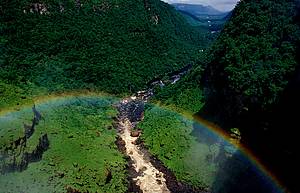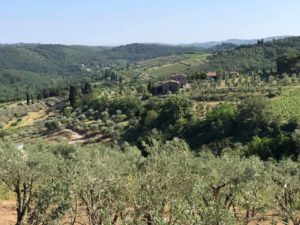Salt Water: The Tangy Taste of Energy Freedom
A visitor to Eastern Europe after the fall of communism would have been awestruck by the massive posters touting Winston cigarettes as “the taste of freedom” that often plastered locations where posters of Chairman Stalin and his ilk has once fluttered. It looked as if Christo had wrapped the Iron Curtain in a project sponsored by R.J. Reynolds.
If there were a taste to energy freedom, it would be salt for sure. Our ancestral mother, the ocean, forms an almost unfathomable medium of mystery — astronaut Scott Carpenter once noted that we know more about the heavens than the sea — but for biofuels, there is every urgent reason to look carefully to salt-friendly projects that can utilize brackish water, or marshes, or the abundant three-dimensional world of the oceans.
Virtually all biofuels projects, at massive scale, run into problems of land and freshwater. A million gallons of this, or even a billion gallons of that, are generally achievable without material changes in land or water usage. Sandia tells us that 90 billion gallons of fuel in the US is feasible from biomass on a sustainable basis.
But a trillion gallons (and global fuel consumption is 1.2 trillion gallons) is another story. Long-term, we must think in massive scale — though hybrids will help much, and in OECD countries we can expect lowered energy intensity, global development (especially in non-OECD countries) in an ongoing international imperative that imperils resources.
Scale-up is tough everywhere, tougher where we need it, toughest where some of the most urgent action is needed, such as developing nations.
Saltwater-oriented biofuels developers are giving us vital options for scale-up, yet we are not always as well tuned to these developments. Herewith, a correction, with this special review of progress in saline biofuels. The catalyst – a new project to produce biofuels on a 125,000 parcel of brackish land in Egypt. But there’s much, much more a-happening.
Salicornia
Salicornia, a halophyte, identified as the most promising salt-water tolerant land-based plant for biofuels
In Texas, Energy Allied International, The Seawater Foundation and Global Seawater, have executed an MOU to jointly develop New Nile Company in Egypt. It will be the irst commercial scale seawater-based biofuels project, and one of the largest biofuels investments to date in the Middle East and Africa. New Nile said it intends to produce “tens of millions of liters of biofuels” from 50,000 hectares (125,000 acres) at one of several potential site locations situated inland, along the Mediterranean and Red Sea coastlines.
New Nile Co will target the European civil aviation market which is subject to strict EU regulations, with aviation entering the EU Emissions Trading Scheme in 2012, and expects to complete its feasibility study this year, and commence construction in early 2011. ??The project is based on Integrated Seawater Agriculture Systems developed by Global Seawater in Meixco and tested in Eritrea. ISAS utilizes effluent from seawater aquaculture (e.g. fish and shrimp ponds) as a natural fertilizer to cultivate sizable plantations of salicornia, a halophyte (i.e. naturally salt resistant plant) capable of yielding large volumes of high grade vegetable oil for use as a biofuel feedstock. The model was developed in Mexico and tested in Eritrea.
Just yesterday in Norway, Seaweed Energy Solutions announced a patent on the first ever modern structure to enable mass seaweed cultivation on an industrial scale in the world¹s oceans. The Seaweed Carrier is a sheet-like structure that basically copies a very large seaweed plant, moving freely back and forth through the sea from a single mooring on the ocean floor. According to SES, growing seaweed in farms covering an area of just less than 0.05 percent of Europe’s coastal regions would yield a yearly production of 75 million tons of seaweed. This biomass could be converted into an estimated 846 Mgy (3.2 billion litters) of ethanol.
In January, the Masdar Institute of Science and Technology, Boeing, Etihad Airways and UOP Honeywell announced the UAE’s first Sustainable Bioenergy Research Project (SBRP) using seawater and the desert for bio-energy in Abu Dhabi. The project will for the first time demonstrate the commercial viability of using integrated saltwater agriculture to provide biofuels for aviation. The Sustainable Bioenergy Research Project has a five-year timeline.
Salt Water: The Tangy Taste of Energy Freedom | Renewable Energy World









